The Upstairs: Difference between revisions
KestrelGirl (talk | contribs) m Proofread Tag: visualeditor |
mNo edit summary Tag: visualeditor-wikitext |
||
| Line 33: | Line 33: | ||
The '''September Bureau''' employs '''Inspectors''',<ref>{{Citation|https://fallenlondon.wiki/wiki/Cut_with_Moonlight|Cut with Moonlight|Fallen London|}} ''"Inspectors of the September Bureau observe from the sidelines."''</ref> who keep tabs on political enemies and maintain order when those wanted are hanged.<ref>{{Citation|https://fallenlondon.wiki/wiki/Cut_with_Moonlight|Cut with Moonlight|Fallen London|}} ''"The condemned man thrashes [...] his legs finish kicking, the Inspectors cross a name off their list. [...] Inspectors of the September Bureau keep the crowd at bay."''</ref> | The '''September Bureau''' employs '''Inspectors''',<ref>{{Citation|https://fallenlondon.wiki/wiki/Cut_with_Moonlight|Cut with Moonlight|Fallen London|}} ''"Inspectors of the September Bureau observe from the sidelines."''</ref> who keep tabs on political enemies and maintain order when those wanted are hanged.<ref>{{Citation|https://fallenlondon.wiki/wiki/Cut_with_Moonlight|Cut with Moonlight|Fallen London|}} ''"The condemned man thrashes [...] his legs finish kicking, the Inspectors cross a name off their list. [...] Inspectors of the September Bureau keep the crowd at bay."''</ref> | ||
[[September]] was taken as a political prisoner by royal authorities, died in prison, and became a martyr figure for various revolutionary groups.<ref>{{Citation|https://fallenlondon.wiki/wiki/Balmoral_As_Before|Balmoral As Before|Fallen London|}}</ref> It is unknown whether his title was passed down after his death. | [[September]] was taken as a political prisoner by royal authorities, died in prison, and became a martyr figure for various revolutionary groups.<ref>{{Citation|https://fallenlondon.wiki/wiki/Balmoral_As_Before|Balmoral As Before|Fallen London|}}</ref><ref name = "september speech">{{Citation|https://fallenlondon.wiki/wiki/Accompany_September|Accompany September|Fallen London|}} ''"September listens [...] He hears his name [...] repetitions of the speech he gave on Pall Mall, of an end to Union and the Empire and thus to all tyrants. [...] the thundering wheels of the Empress' coach and the long slow starvation in some black cell below the Palace. [...] those who came out to the streets in his name and marched north."''</ref> It is unknown whether his title was passed down after his death. | ||
=== The December Office === | === The December Office === | ||
| Line 54: | Line 54: | ||
<blockquote>''"Her Majesty sieged. Consort in the cairn. Be brave fir our lads in scarlet. There's silver in th' wood. Might be I don't catch you awhile."''<ref name = "compel ghillie">{{Citation|https://fallenlondon.wiki/wiki/Compel_the_Ghillie_to_extend_your_visit|Compel the Ghillie to extend your visit|Fallen London|}}</ref></blockquote> | <blockquote>''"Her Majesty sieged. Consort in the cairn. Be brave fir our lads in scarlet. There's silver in th' wood. Might be I don't catch you awhile."''<ref name = "compel ghillie">{{Citation|https://fallenlondon.wiki/wiki/Compel_the_Ghillie_to_extend_your_visit|Compel the Ghillie to extend your visit|Fallen London|}}</ref></blockquote> | ||
[[File:September.png|alt=A man with long red hair and a beard.|thumb|[[September]]]] | [[File:September.png|alt=A man with long red hair and a beard.|thumb|[[September]]]] | ||
[[September]] in the Upstairs gained notoriety for making an impassioned speech against the Empire and the Union (of England, Scotland, Wales, and Ireland). He was soon arrested and locked in the cells of the [[The Shuttered Palace|Palace]], where he died of starvation. After the revolutionary takeover of [[London]] succeeded and the Queen was exiled, a group called the '''Septemberists''' marched to [[Balmoral]] seeking retribution.<ref | [[September]] in the Upstairs gained notoriety for making an impassioned speech against the Empire and the Union (of England, Scotland, Wales, and Ireland). He was soon arrested and locked in the cells of the [[The Shuttered Palace|Palace]], where he died of starvation. After the revolutionary takeover of [[London]] succeeded and the Queen was exiled, a group called the '''Septemberists''' marched to [[Balmoral]] seeking retribution.<ref name = "september speech"/><ref name = "flatter ghillie">{{Citation|https://fallenlondon.wiki/wiki/Flatter_the_Ghillie_into_extending_your_visit|Flatter the Ghillie into extending your visit|Fallen London|}}</ref> The Queen's remaining soldiers, including the '''Queen's Household Guard''', mobilized to defend her, and so began a brutal war.<ref>{{Citation|https://fallenlondon.wiki/wiki/Lay_a_trail|Lay a trail|Fallen London|}} ''"Septemberists or the Queen's Household Guard. Can one tell the difference in the dark?"''</ref> | ||
[[File:Forestnight.png|alt=Moonlit woods.|thumb|The woods of [[Balmoral]].]] | [[File:Forestnight.png|alt=Moonlit woods.|thumb|The woods of [[Balmoral]].]] | ||
The Septemberists laid siege to Balmoral<ref name = "compel ghillie"/> and even constructed a guillotine nearby.<ref>{{Citation|https://fallenlondon.wiki/wiki/Leave_the_woods_3|Leave the woods 3|Fallen London|}} ''"Balmoral stands [...] its walls blackened [...] its windows broken. [...] Someone has erected a guillotine on the lawn [...]"''</ref> Loyalists held them back,<ref name = "flatter ghillie"/> so the woods nearby became a bloody battleground.<ref name = "wander the woods">{{Citation|https://fallenlondon.wiki/wiki/Wander_the_woods|Wander the woods|Fallen London|}}</ref> Other nearby landmarks, such as the River Forth, were also theaters of the conflict.<ref>{{Citation|https://fallenlondon.wiki/wiki/Leave_the_woods|Leave the woods|Fallen London|}} ''"When the balladeers held the Forth till the water ran crimson [...]"''</ref> | The Septemberists laid siege to Balmoral<ref name = "compel ghillie"/> and even constructed a guillotine nearby.<ref>{{Citation|https://fallenlondon.wiki/wiki/Leave_the_woods_3|Leave the woods 3|Fallen London|}} ''"Balmoral stands [...] its walls blackened [...] its windows broken. [...] Someone has erected a guillotine on the lawn [...]"''</ref> Loyalists held them back,<ref name = "flatter ghillie"/> so the woods nearby became a bloody battleground.<ref name = "wander the woods">{{Citation|https://fallenlondon.wiki/wiki/Wander_the_woods|Wander the woods|Fallen London|}}</ref> Other nearby landmarks, such as the River Forth, were also theaters of the conflict.<ref>{{Citation|https://fallenlondon.wiki/wiki/Leave_the_woods|Leave the woods|Fallen London|}} ''"When the balladeers held the Forth till the water ran crimson [...]"''</ref> | ||
Revision as of 16:34, 5 February 2023
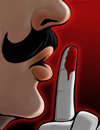
|
Beyond this point lie major spoilers for Fallen London, Sunless Sea, Sunless Skies, or Mask of the Rose. This may include endgame or major Fate-locked spoilers. Proceed at your own risk. You can find out more about our spoiler policy here. |
"You find the parson balanced atop a pile of furniture. He is daubing a message on the ceiling in a concoction of ash from the fireplace and wine from the cabinet. 'THE BATS NEVER CAME,' it reads."[1]
The Upstairs is a version of London that never fell to the Neath. It can be seen through exposure to moonlight.
Under the Moonlight
"Another one gone Upstairs. What is wrong with our d__n sunlight?"[1]

The Upstairs is a vision of a world where London never Fell, caused by exposure to moonlight.[2] Sunlight smugglers mix their product with moonlight to cut costs,[3][4] but this practice may cause customers to "go Upstairs,"[5] giving them false memories,[6] delusions, or hallucinations,[7] which may be persistent.[8]
Being on the Surface, the Upstairs is usually lit by the Moon and the night sky,[9] though daylight can be seen too.[10] Sailors - not zailors! - toil at the docks of London, living as they normally would. The city feels familiar, yet strangely tense.[11]
The Revolutionary Council
"Smiling marchers reach out to shake your hand, to kiss your cheek. The Revolutionary Parliament is building a new society – one parade, one song, one speech at a time."[1]
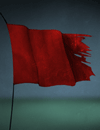
Rather than falling to the Neath, London instead "fell" to revolutionaries. It is now governed by the Revolutionary Council, a counterpart to the Calendar Council, who gained power following months of civil war. Their ascent brought peace,[12][13] but the Queen was exiled to Balmoral and is now known as Her Exiled Majesty.[14]
The Council established the Revolutionary Parliament[15] and reformed the Church into a new religion of the Everyman.[16] Public safety is still managed by the Constables, though they wear black hats instead of blue.[17] Days of the week were renamed, with one day being Pluto's Day.[18] Commerce is managed by ration inspectors,[19] who grant allowances to citizens in exchange for mandats (documents resembling currency).[20]
The Council is composed of several organizations, each named after a month of the calendar.[21] While these divisions are effective, some suffer from corruption and infighting.[22]
The March Bureau
"The latest of the March Bureau's parades is underway – this one is to commemorate the York Martyrs, gunned down by her Exiled Majesty's soldiers. You hear the approaching stamp of feet."[1]
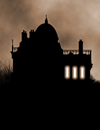
The March Bureau bears a seal of a trumpet and a flag.[23] They hold parades to celebrate the revolution and its figures, such as the York Martyrs killed by the Queen's forces.[24][25] They also keep Greenwich safe from canines called Pale Dogs by rewarding mandats to those who hunt them.[26]
An organization known as the Marchists is known to exist,[22] but its purpose is unknown, as is March's status.
The September Bureau
"You push to the front, where Inspectors of the September Bureau keep the crowd at bay. A wrinkled flower-seller screams a curse on Her Exiled Majesty, who cowers at Balmoral. You join in."[1]
The September Bureau employs Inspectors,[27] who keep tabs on political enemies and maintain order when those wanted are hanged.[28]
September was taken as a political prisoner by royal authorities, died in prison, and became a martyr figure for various revolutionary groups.[29][30] It is unknown whether his title was passed down after his death.
The December Office
"Moonlight burns on the marble of the arch. It limns the gallows in silver. It highlights the muzzle of the executioner's dog mask, the sign of the December Office. The crowd bays for a hanging."[1]
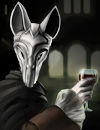
The December Office employs executioners who wear white canine masks,[31] similar to the mask of December.[32] They have converted the Marble Arch of Marylebone into a hangman's arch,[33] and they execute political prisoners such as unpopular Lords of the old Parliament.[34]
December themself is alive and apparently well, though they are a target of the city's counterrevolutionaries.[35]
Coldstream Opposition
"On the far side of the stampeding crowd, you see a man climb on a cart. He wears a red uniform, belted with white – the colours of the Coldstream counter-revolutionaries. "For her Majesty!" he cries. "For Balmoral! Death to December!""[1]
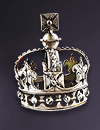
Despite the Queen's exile, various groups of royalists remain active;[36] one such faction are the Coldstream counter-revolutionaries. They wear red uniforms with white accents,[37] and fly a flag with a "red cross inside a blue circle, inside a white star".[38]
This counter-faction observes the Revolutionary Council's weaknesses,[39] and exploits these by staging riots and bombings to disrupt the new government. Unfortunately, their actions are known to cause civilian casualties.[40][41]
The Septemberist Revolution
"The moon crests the hill behind the Castle, silvering its mullioned windows. Here in the woods the air is thick with smoke and hushed with quiet, fretful chatter. Beyond the river, the alliance of France, the Unions and the March Bureau gather, ready for revenge for Lost September."[42]
"Her Majesty sieged. Consort in the cairn. Be brave fir our lads in scarlet. There's silver in th' wood. Might be I don't catch you awhile."[43]

September in the Upstairs gained notoriety for making an impassioned speech against the Empire and the Union (of England, Scotland, Wales, and Ireland). He was soon arrested and locked in the cells of the Palace, where he died of starvation. After the revolutionary takeover of London succeeded and the Queen was exiled, a group called the Septemberists marched to Balmoral seeking retribution.[30][44] The Queen's remaining soldiers, including the Queen's Household Guard, mobilized to defend her, and so began a brutal war.[45]

The Septemberists laid siege to Balmoral[43] and even constructed a guillotine nearby.[46] Loyalists held them back,[44] so the woods nearby became a bloody battleground.[47] Other nearby landmarks, such as the River Forth, were also theaters of the conflict.[48]
The Septemberists suffered heavy losses due to loyalist ambushes,[47] but their cause drew the attention of the Third Republic of France, the March Bureau, other allies within the Union,[49] and the Celtic Republics.[50] Whatever the conclusion of this tale may be,[51] it remains unwritten.
References
|